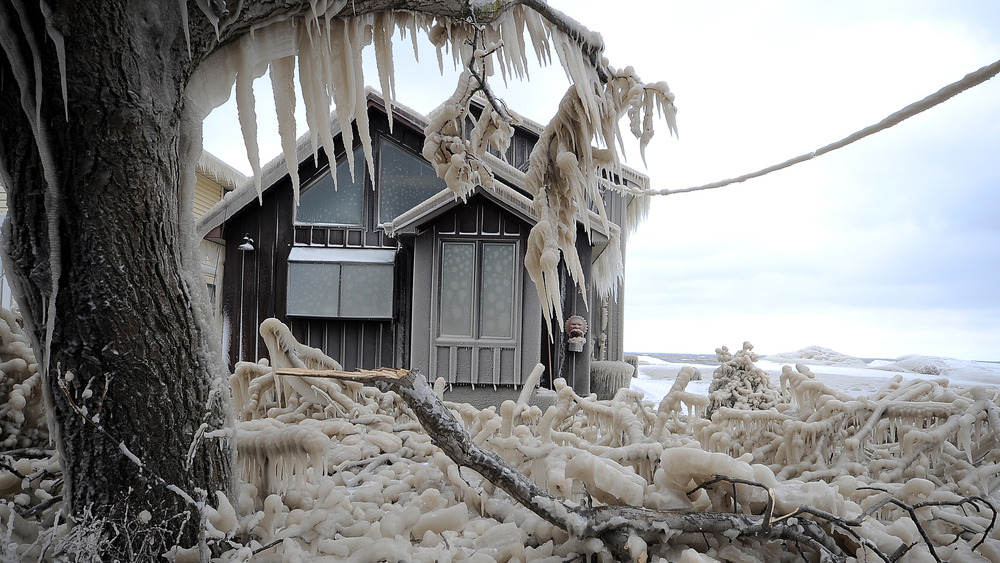Can You Really Be Allergic To Cold Weather? The Answer Might Surprise You
Allergy rates have shot up around the world in recent decades, particularly when it comes to food. According to the BBC, children worldwide are more likely to develop allergies than ever before. This is bad enough in itself, but is made worse by the fact that, really, no one knows why allergy rates are going up the way they are. What we do know, however, is that the proportion of people with allergies has seen a dramatic increase in industrialized areas such as cities, and that the cause of such conditions is likely to be environmental.
More than ever, people are developing severe allergies to such foods as dairy, peanuts, and sesame, and suffering reactions such as hives, vomiting and other digestive problems, and, worse of all, anaphylactic shock.
It's not just food allergies that are increasing. More people than ever are suffering from hay fever, which is an adverse response to pollen, as well as dust mites, which has become a problem especially among those living in smaller dwellings in the middle of big cities. It seems that the range of allergies is increasing, too, with some rare and surprising cases being especially debilitating. As strange as it might seem, allergies to sunlight are reportedly on the rise, as are allergies to cold temperatures. Though that might seem odd at first reading, as Live Science reports, such allergies can in fact be deadly.
A deadly allergy to the cold
In October 2020, the Journal of Emergency Medicine published "Cold Anaphylaxis: A Case Report," which outlined the case of a 34-year-old man in Colorado whose unusual allergy affliction almost cost him his life.
According to the report, the man in question had taken a hot shower, and, upon encountering the cold air of the bathroom, had suddenly collapsed on the ground. He was found by members of his family, who saw that he was having severe difficulty breathing and was breaking out in an angry red rash, later diagnosed as hives. Paramedics were called, who were informed that the man had previously suffered skin complaints due to Colorado's cold weather, but had never before had such a severe reaction.
The man was treated with oxygen to improve his breathing. "He required two doses of intramuscular epinephrine and was ultimately started on an epinephrine infusion," the report states.
The man was suffering from anaphylaxis, or, as it was later diagnosed, cold-induced urticaria. The diagnosis was confirmed with the use of an "ice cube test," in which an ice cube was pressed to the man's skin for five minutes. It was found that the man's skin reacted to the cube by becoming red and swollen, giving the doctors a positive diagnosis.
Raising awareness of unusual allergies
Allergies can start to become a problem and an active concern in people's lives for a number of reasons. For the man described in the cold anaphylaxis case report, cold weather became a problem after he'd moved to Colorado from Micronesia, according to Live Science. The man's immune system had obviously had an adverse reaction to his relocating from the comparatively warm temperatures of the tropical climate to one of the colder regions of the northern hemisphere.
The allergy's most common symptom is a rash, but cold-induced urticaria can reportedly be highly dangerous when the body is subjected to a full-body exposure to below-average temperatures.
Such reports as that published in the Journal of Emergency Medicine are of critical importance to doctors amid the new allergy epidemic, as they highlight the unexpected severity of rare allergies that have, until now, not been considered to be life-threatening. There are currently more than 7,000 allergists at work in the United States, studying new treatments, potential cures, and the reasons that more and more of us are suffering from allergies. Even the most innocuous allergies can prove to be debilitating: New Scientist reports for instance that driving with severe hay fever carries the same risk as driving drunk. As they say, such facts are not to be sniffed at.


